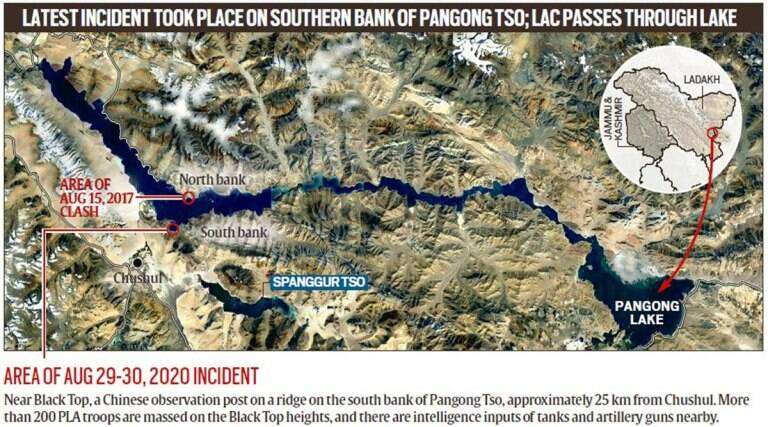On Saturday evening, the Indian military thwarted an attempt by China to change the status quo near the Royal Line of Control (LAC) by deploying its troops to a previously undeployed area on the southern shore of Pangong Tso Lake in Ladakh.
” Chinese troops had violated the consensus they had reached in military and diplomatic clashes during the ongoing clash in eastern Ladakh and had led provocative military movements to change the status quo”.
The military said in a statement on Monday morning

While Lake Pangong has been one of the most controversial areas in the ongoing military standoff in eastern Ladakh for nearly four months, activity has so far been limited to the northern shore.
What is Pangong Lake?
- Popularized by the Hindi film 3 Idiots, Pangong Tso is an endorheic (landlocked) lake that is found partly in the Ladakh region of India and partly in Tibet.
- The name reflects the mixed heritage of the lake; Pangong in Ladakhi means a large concavity, the word Tso in Tibetan means lake.
- Located at an elevation of about 4,270 m, it is a narrow lake nearly 135 km long (6 km at its widest point) and shaped like a boomerang. Its total area is over 600 square kilometers.
- The Karakoram mountain range, which crosses Tajikistan, Afghanistan, Pakistan, China and India, with heights of over 6,000 meters, including K2, the second highest peak in the world, ends on the north bank of the Pangong Tso. Its southern shore also has high shattered mountains that slope down to Spangur Lake in the south.
- The water in the lake, although crystal clear, is brackish and therefore cannot be drunk. The lake freezes over during the winter, which also allows some movement of vehicles.
Who controls Pangong Tso?
- Almost two-thirds of the lake is controlled by China, with about 45 km under Indian control. The LAC, which runs north to south, crosses the western part of the lake, aligned from east to west.
- But India and China have unstable borders, and the perception of CLA differs across multiple sectors, including Pangong Tso.
- On the north shore of the lake, according to India, the international border is near Fort Khurnak, a 19th century ruin. But LAC, according to India, is about 15 km to the west.
- On the north shore, there are spurs that go into the lake, identified as fingers. India says BAC goes through finger 8; China claims it is further west.
- Compared to the northern margin, the difference in perception of LAC is not very large in the southern margin.
- A former brigade commander in the area said perception could differ from 100 to 200m and lacked prominent features such as fingers.
- These “different perceptions of the LAC”, as the military called it, are one of the main causes of the clashes.
What is Pangong Tso’s current status?
- The north shore was one of two points in eastern Ladakh which experienced friction in early May which led to the clash which is now nearly four months old.
- On the night of May 5-6, the troops engaged in heavy hand-to-hand combat, although Chinese soldiers were armed with rods and nails with nails.
- There was a similar fight in the Galwan Valley on May 6. However, these violent clashes did not result in deaths, unlike the June 15 clash in the Galwan Valley in which India lost 20 soldiers and an undeclared number of Chinese soldiers were also killed.
- Since then, China has changed the status quo and its troops had occupied the region between Finger 8 and Finger 4, which was patrolled by both but was previously not occupied by either side.
- Chinese troops continue to occupy Finger 4 Ridge, although they have withdrawn from Finger 4 base to Finger 5 base. But China has strengthened its positions in the region.
- The slight setback was part of the initial disengagement process after the June 15 clashes. However, there has been no improvement in the situation since mid-July and negotiations have stalled.
How are the two banks different?
- Until this weekend, the south shore had been calm during the clash. Army sources said India has traditionally been more present on the South Rim compared to the North Rim, due to its proximity to areas such as Chushul and Rezang La.
- The former brigade commander explained that the north shore has only become the center of attention in recent years, due to clashes between the patrol units.
- Traditionally, the South Rim has been in the spotlight, as it is just north of the access to Chushul. This is also the reason why the south shore has always had a stronger presence of Indian forces.
- The region south of the lake is also of strategic importance for both countries.
- The area, known as the Chushul Approach, is one of the few areas that can be used as a launch pad for an offensive, due to the plains.
- During the 1962 conflict, both banks witnessed a Chinese offensive and India lost territory in both; first in Sirijiap, then the entire north coast on October 22; on the south coast, India had to abandon its post complex at Yula and move to an elevated area north of Gurung Hill.
- Over the weekend, the army said Indian troops “had anticipated this PLA activity on the southern shore of Pangong Tso Lake, taken steps to strengthen our positions and thwart Chinese intentions to change them unilaterally.” made in the field ”.
- India has taken a more advantageous position, albeit still on its LAC side, to prevent China from meddling in the region.

More Stories
AIBE 19 Result: Bar Council of India to Announce Soon – Key Details for Candidates
CUET PG 2025 Admit Card: Key Details and Important Updates
Changes in CUET Subject Combinations: Impact on Science and Commerce Students